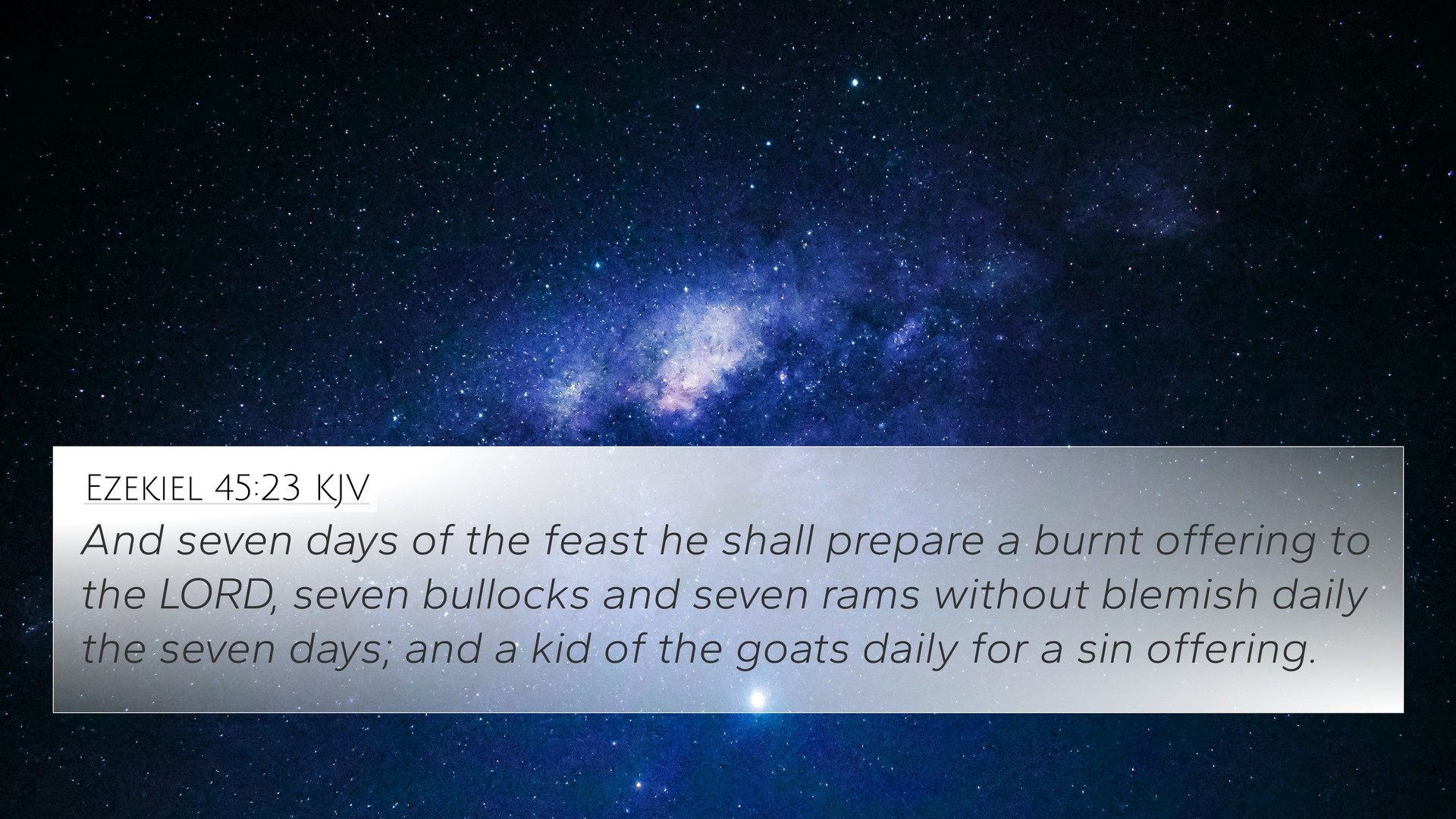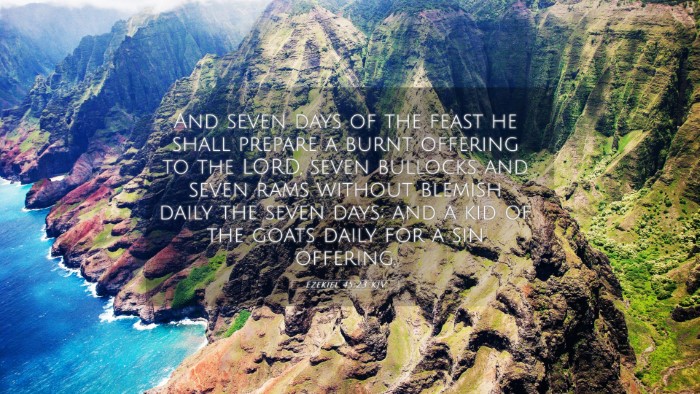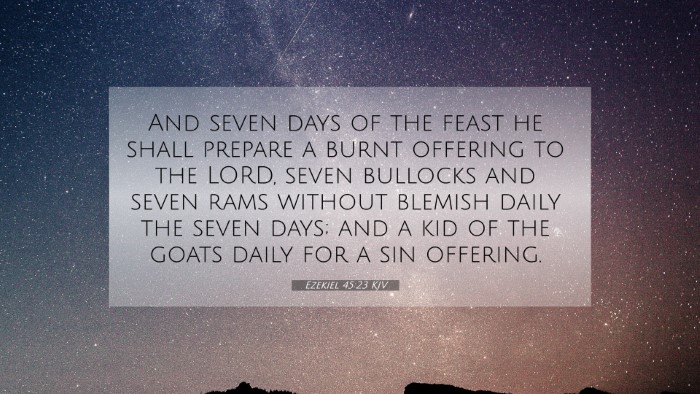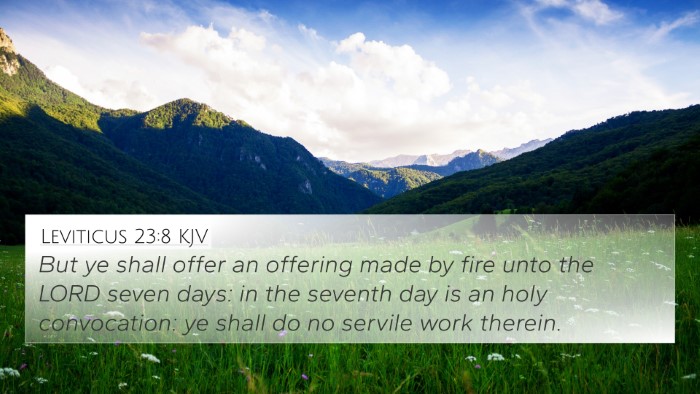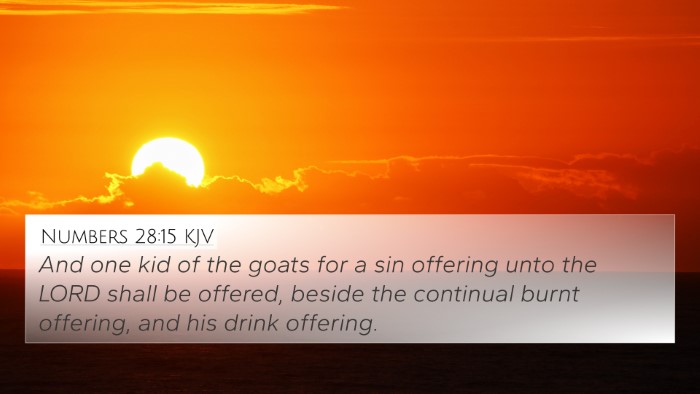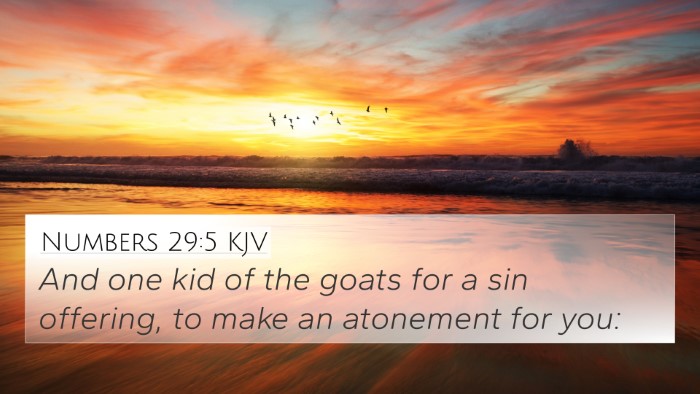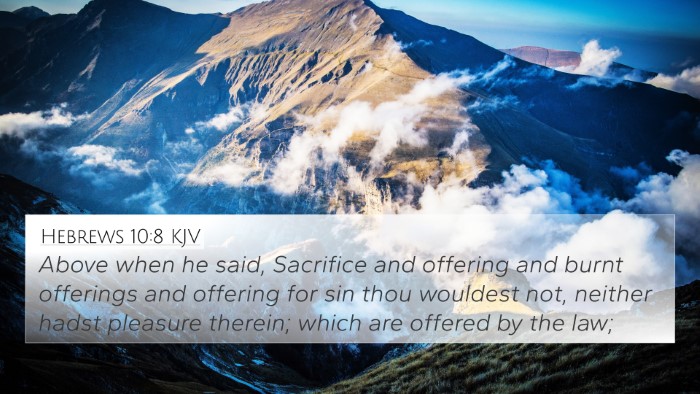Ezekiel 45:23 - Understanding the Verse
Ezekiel 45:23 states: "And in the feast of the seven days, he shall prepare a burnt offering to the Lord every day: the seven bullocks, and seven rams without blemish shall be daily the seven days; and a kid of the goats daily for a sin offering." This verse is situated within the context of God's instructions for the temple offerings and rituals during significant Jewish feasts.
Meaning of Ezekiel 45:23
The offerings described in this verse reflect the deeply rooted practices of ancient Israelite worship, emphasizing the necessity of atonement and consecration during sacred times. In this passage, Ezekiel is outlining the specific requirements for daily offerings during a festival, underscoring a profound dedication to ritual purity and devotion to God.
Insights from Commentaries
- Matthew Henry: Henry notes the importance of continual sacrifice as a means to ensure God's favor and presence. The meticulous nature of the offerings serves as a reminder of Israel's covenant relationship with God, thereby signifying that their approach towards worship must be characterized by sincerity and intentionality.
- Albert Barnes: Barnes explains that these offerings during the festival illustrate the significance of dedication to spiritual observance. The number of offerings (seven) is indicative of completeness and perfection in biblical terms, suggesting that the act of offering was not merely a ritualistic formality, but a heartfelt expression of devotion.
- Adam Clarke: Clarke elaborates on the purpose behind these offerings. He emphasizes that they serve not only as acts of penance but also as moments of communal connection among the people, fostering unity in their worship. This ritual approach enhances the collective experience of divine worship, reinforcing the belief that God's presence is sought through communal obedience.
Cross-References to Ezekiel 45:23
Understanding Ezekiel 45:23 is enriched through various cross-references across Scripture:
- Leviticus 23:37-38: This section outlines festivals and their corresponding offerings, paralleling the types of burnt offerings commanded in Ezekiel.
- Numbers 28:29: Similar offerings during sacred times are described, reinforcing the consistent importance of atoning sacrifices throughout the Torah.
- Ezekiel 46:6-7: This further explains the process of offerings in greater detail, affirming the themes established in 45:23.
- Hebrews 10:1-4: In the New Testament, these sacrifices are contrasted with Christ's ultimate sacrifice, showing the transition from the Old Covenant to the New.
- Romans 12:1: Paul calls believers to present themselves as living sacrifices, echoing the enduring principle of offering oneself to God.
- 1 Peter 2:5: Describing believers as living stones, this verse aligns with the themes of offering and dedication seen in Ezekiel.
- Psalms 51:16-17: The significance of a broken spirit over material offerings emphasizes the heart posture that God desires from His worshipers.
Thematic Connections
The verse encapsulates prevalent themes in the Old Testament regarding atonement, worship, and covenant faithfulness. The ritualistic offerings represent a form of inter-Biblical dialogue where the practices of the Israelites converge with New Testament principles of worship.
Recommendations for Further Study
For readers seeking to deepen their understanding of Ezekiel 45:23 and its implications, employing bible cross-reference guides can be incredibly beneficial. Tools such as a bible concordance will facilitate the identification of related themes and interconnected scriptures. Here are some strategies:
- Use a Bible Concordance: Locate related scriptures and contextually analyze their connections.
- Cross-Reference Bible Study: Compare verses from both the Old and New Testaments to uncover thematic links.
- Identifying Old and New Testament Connections: Focus on how ceremonial laws, such as those in Ezekiel, are fulfilled in Christ.
Final Thoughts
In today's context, Ezekiel 45:23 reminds believers of the greater sacrifice that Jesus Christ provided, while also inviting them to reflect on their worship practices. The dedication seen in the rituals of ancient Israel can inspire modern believers to approach God with a similar heart posture—one of earnestness, respect, and genuine intent.
Understanding Ezekiel 45:23 through a comprehensive lens allows readers to appreciate the richness of the Scripture, connecting the dots between cross-referencing biblical texts and the heart of biblical worship.
